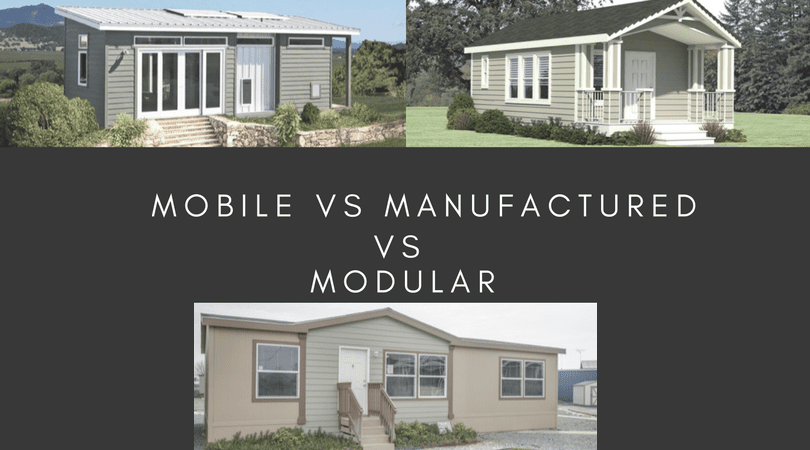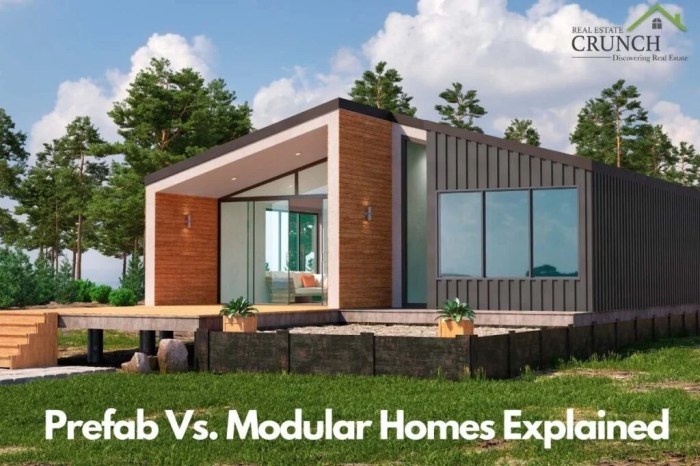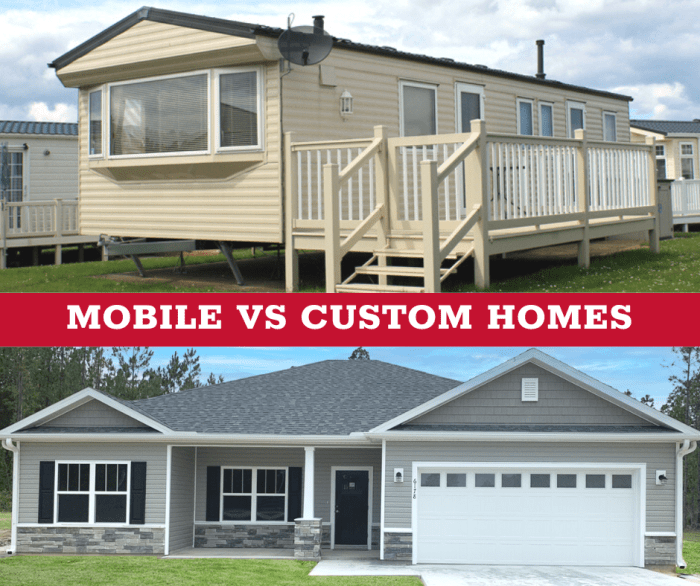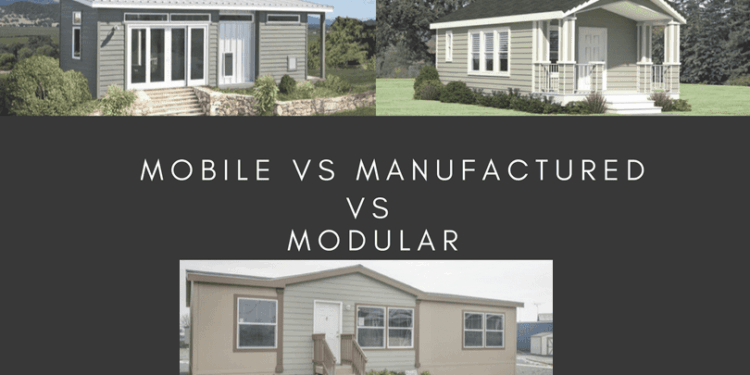Exploring the differences between custom built homes and modular homes unveils a world of unique features and customization options. This comparison delves into the design, construction, cost, and sustainability aspects of these two popular housing options, providing valuable insights for those considering their dream home.

Custom Built Homes
Custom built homes are residences that are designed and constructed according to the specific preferences and needs of the homeowner. Unlike pre-designed homes, custom built homes offer a unique opportunity for individuals to create a living space that reflects their personal style, functional requirements, and aesthetic preferences.
Unique Features of Custom Built Homes
- Customization Options: Custom built homes allow homeowners to choose every detail of their home, from the layout and size of rooms to the materials used for construction.
- Personalization: Homeowners can personalize their space with unique features such as built-in storage solutions, energy-efficient appliances, and smart home technology.
- Quality Craftsmanship: Custom built homes are known for their high-quality construction and attention to detail, ensuring a durable and long-lasting living space.
Comparison with Modular Homes
When comparing customization options, custom built homes offer a higher degree of flexibility and personalization compared to modular homes. While modular homes also provide some degree of customization, they are limited by pre-set designs and floor plans.
Designing a Custom Built Home
The process of designing a custom built home typically involves working closely with architects, designers, and builders to create a unique floor plan and design that meets the homeowner's specific requirements. This process includes multiple stages such as conceptual design, detailed planning, material selection, and construction.
Modular Homes
Modular homes are prefabricated homes that are built in sections in a factory setting and then transported to the building site for assembly. These homes are constructed using the same materials and to the same building codes as traditional stick-built homes.
Benefits of Choosing a Modular Home
- Cost-Effective: Modular homes are typically more affordable than custom built homes due to the efficient factory production process.
- Quick Construction: Modular homes can be built in a fraction of the time compared to traditional homes, saving time and reducing labor costs.
- Quality Control: The controlled environment of a factory ensures that modular homes are built to high-quality standards and meet strict regulations.
- Design Flexibility: Despite being prefabricated, modular homes offer a range of customization options to suit individual preferences.
Cost Differences
On average, modular homes tend to be more cost-effective than custom built homes. The streamlined production process in a factory setting helps reduce construction costs, making modular homes a more budget-friendly option for homeowners.
Sustainability and Energy Efficiency
Modular homes are designed with sustainability in mind, utilizing eco-friendly materials and energy-efficient features. These homes are often built with insulation and other green technologies to reduce energy consumption and lower utility bills for homeowners.
Design and Construction
When it comes to design and construction, custom built homes and modular homes offer unique features and considerations that cater to different preferences and needs.
Design Flexibility of Custom Built Homes
Custom built homes provide unparalleled design flexibility, allowing homeowners to work closely with architects and builders to create a personalized space that meets their exact specifications. From the layout and floor plan to the materials and finishes used, every aspect of a custom built home can be tailored to reflect the homeowner's style and preferences
.
Construction Timeline
The construction timeline for custom built homes is typically longer than that of modular homes. Since custom homes are built on-site from the ground up, the process can take several months to complete. On the other hand, modular homes are constructed in a factory-controlled environment simultaneously while site work is being done, which can reduce the overall construction timeline significantly.
Quality Control Measures
Both custom built homes and modular homes adhere to strict quality control measures to ensure that the final product meets industry standards and regulations. Custom built homes undergo regular inspections and quality checks throughout the construction process, while modular homes are subject to factory inspections and quality control protocols before being transported to the site.
Durability and Long-Term Maintenance
Custom built homes are often perceived as more durable and long-lasting due to the use of high-quality materials and craftsmanship. Homeowners have the ability to select premium materials that can withstand the test of time, reducing the need for frequent maintenance and repairs.
Modular homes, on the other hand, are designed to be structurally sound and durable, but the quality of materials used may vary depending on the manufacturer and builder.
Cost and Financing

When it comes to custom built homes versus modular homes, the cost and financing options play a significant role in the decision-making process. Let's explore the factors that influence the cost of each type of home and compare the financing options available.
Factors Influencing Cost
- Size and complexity of the home design
- Location of the property
- Quality of materials used
- Customization and upgrades
- Landscaping and exterior features
Financing Options
- Custom Built Homes:
- Traditional construction loans
- Home equity loans or lines of credit
- Mortgages
- Modular Homes:
- Construction-to-permanent loans
- Manufactured home loans
- Financing through modular home builders
Cost Savings and Additional Costs
Choosing a modular home over a custom built home can potentially lead to cost savings due to the controlled manufacturing process and reduced construction time. However, additional costs may arise for both types of homes:
- Custom Built Homes:
- Architectural and design fees
- Permitting and inspection costs
- Customization expenses
- Landscaping and outdoor amenities
- Modular Homes:
- Delivery and installation fees
- Site preparation and foundation costs
- Customization upgrades
- Utility connections and landscaping
Closing Summary

In conclusion, the choice between custom built homes and modular homes ultimately boils down to individual preferences, budget considerations, and long-term goals. Both options offer distinct advantages, and understanding the nuances of each can guide you towards making the right decision for your future abode.
User Queries
What are some unique features of custom built homes?
Custom built homes often include personalized design elements such as specialty lighting, built-in storage solutions, and custom cabinetry.
How do modular homes differ from traditional homes?
Modular homes are prefabricated in sections off-site and then assembled on the property, unlike traditional homes that are built entirely on-site.
Are modular homes more cost-effective than custom built homes?
Modular homes can be more cost-effective due to streamlined construction processes and reduced labor costs compared to custom built homes.
What factors influence the cost of custom built homes?
Factors such as location, size, design complexity, and quality of materials can significantly impact the cost of custom built homes.
What financing options are available for modular homes?
Financing options for modular homes are similar to traditional mortgage loans, including FHA, VA, and conventional loans.

 When it comes to custom built homes versus modular homes, the cost and financing options play a significant role in the decision-making process. Let's explore the factors that influence the cost of each type of home and compare the financing options available.
When it comes to custom built homes versus modular homes, the cost and financing options play a significant role in the decision-making process. Let's explore the factors that influence the cost of each type of home and compare the financing options available.
 In conclusion, the choice between custom built homes and modular homes ultimately boils down to individual preferences, budget considerations, and long-term goals. Both options offer distinct advantages, and understanding the nuances of each can guide you towards making the right decision for your future abode.
In conclusion, the choice between custom built homes and modular homes ultimately boils down to individual preferences, budget considerations, and long-term goals. Both options offer distinct advantages, and understanding the nuances of each can guide you towards making the right decision for your future abode.












